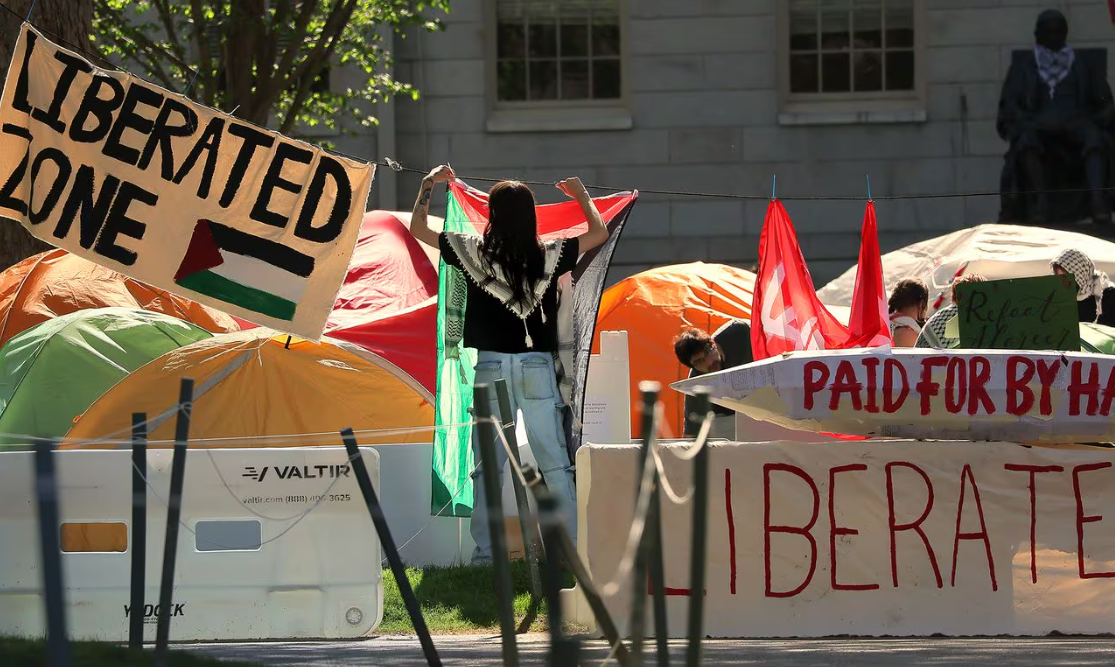哈佛大学和麻省理工学院就制裁亲巴勒斯坦示威者展开激烈辩论

【中美创新时报2024 年 5 月 19 日编译讯】(记者温友平编译)麻省理工学院和哈佛大学的亲巴勒斯坦营地已经消失,但抗议者事业两边的教师、学生、校友和倡导者正在激烈争论大学的纪律处分。《波士顿环球报》记者Hilary Burns 和 Lila Hempel-Edgers 对此作了下述详细报道。
在这两所大学,一些抗议者被停学或阻止毕业,这危及了他们完成期末考试的能力,并使计划中的实习、工作和研究机会面临风险。今年春天,麻省理工学院和哈佛大学迄今为止比马萨诸塞州其他任何在校园内设有抗议营地的机构都实施了更严厉的处罚。
麻省理工学院的一些教员表示,他们对抗议者在等待纪律处分程序时陷入困境感到震惊,而纪律程序可能需要数周至数月才能解决。
“麻省理工学院正在摧毁自己学生的职业生涯,”麻省理工学院神经科学教授南希·坎维舍尔说。
麻省理工学院表示,这场持续了 20 天、大约有两打帐篷的营地活动违反了有关允许的抗议时间、地点和方式的准则,并且扰乱了大学的运作。
不过,其他人则认为,大学应该更加严厉,因为学生们多次被警告,他们可能会因违反校规并让一些犹太学生感到不受欢迎的示威活动而面临后果。
哈佛犹太校友联盟写道:“学生、教师和管理人员的核心似乎受到了免费通行证/惩罚,因为他们的行为将导致立即采取行政行动,包括开除任何其他少数族裔或族裔群体。” 《波士顿环球报》在一份声明中向哈佛政府提出了这一要求。
哈佛大学的学生抗议者表示,他们拆除了营地,但前提是学校会对他们采取宽松的纪律处分。
然而,哈佛大学发言人乔纳森·斯温周日表示,临时校长艾伦·加伯无权处理学生纪律问题。哈佛大学管理人员此前告诉学生,“未经授权搭建建筑物、帐篷和桌子是违反大学规定的”,并补充说,扰乱正常活动的学生将面临纪律处分。
最近几周,全国各地的大学领导人一直在努力应对亲巴勒斯坦的抗议活动,在哥伦比亚大学的一个营地被警察强行清理、学生被捕后,抗议活动在四月下旬迅速蔓延。
在马萨诸塞州,其他机构基本上拒绝实施停课,至少到目前为止是这样。艾默生学院表示,不会追究与其营地相关的校园纪律,不过一名发言人告诉《波士顿环球报》,学校正在“审查其他校园违规行为的指控”。马萨诸塞大学阿默斯特分校表示,与该营地相关的纪律处分程序正在进行中;没有人在毕业前被停职。塔夫茨大学和东北大学不愿透露今年春天针对亲巴勒斯坦宣传活动所实施的制裁措施,但目前还没有两所校园出现大规模停课的报道。
哈佛的学生抗议者周末仍对参加营地活动将面临严重后果的消息感到震惊,该活动旨在向哈佛施压,要求其剥离以色列资产。据学生组织者称,本周晚些时候将不允许 14 名高年级学生毕业;目前尚不清楚他们何时会收到文凭。组织者称,5 名本科生被迫从哈佛大学退学,32 名学生因“涉嫌参与”示威活动而被留校察看。
5 月 14 日,在与大学管理人员讨论后自愿前往抗议营地的学生表示,纪律处分令人震惊,因为加伯“给我们联络人的电子邮件明确表示他将允许学生毕业”。
在他们提到的 5 月 14 日发送给营地学生组织者的电子邮件中,加伯表示,哈佛大学将“鼓励”“学校根据现有先例和惯例迅速处理案件(包括在相关情况下考虑自愿离开营地的决定)” ,对于所有学生,包括那些有资格毕业的学生,以便他们能够毕业。”该大学确认了该电子邮件的真实性。
同一天,加伯在致社区的一封宣布拆除营地的信中重申,他将敦促各学校的管理人员“立即为所有非自愿缺勤的个人启动适用的复职程序”,并 “迅速评估”抗议者的案件。他没有透露他认为这些案件应该如何解决。
然而,哈佛大学 5 月 17 日发给犹太校友的一份声明听起来更加严厉:“加伯总统不同意撤销对参加营地的学生的指控。他强烈支持对那些被发现违反大学政策的人采取适当的纪律处分。”
哈佛发言人斯温周日表示:“与学生纪律相关的考虑和决定由哈佛各学院负责。”他说哈佛大学不会对个人纪律处分程序发表评论。
哈佛大学政府教授瑞安·伊诺斯 (Ryan Enos) 表示,大学领导者的行为“要么是恶意、无能,要么是怀恨在心”,并补充说,这些惩罚“与过去的先例不相称”。
伊诺斯说:“这是对信任的可耻侵犯,并增加了学生因演讲内容而受到惩罚的可能性。” “这是对哈佛价值观的侮辱。”
据学生组织者和教授称,麻省理工学院约有 20 名学生已被暂时停学,这意味着他们无法再进入校园建筑、参加毕业典礼、领取学生工作工资或完成期末考试和项目。大多数人还被告知他们需要腾出大学宿舍。麻省理工学院拒绝证实被停学的学生人数。
根据对六名学生和麻省理工学院教授的采访,少数被停学的学生原本预计本学期毕业,但现在他们的文凭、毕业后工作、研究项目和实习都悬而未决。麻省理工学院的营地于 5 月 10 日结束,警方在凌晨驱散了示威活动;10名学生被捕。
麻省理工学院物理学专业大四学生汉娜·迪德巴尼 (Hannah Didehbani) 被停职,她表示,她不知道自己什么时候能获得学位,而且该大学没有提供关于她应该如何继续的细节。
迪德巴尼说:“麻省理工学院之所以采取这些不公正的镇压行动,例如停职、逮捕我们、驱逐我们,是因为他们害怕我们拥有的权力。”
然而,麻省理工学院的大多数教师似乎都赞成对学生抗议者进行纪律处分。哲学教授莎莉·哈斯兰格表示,在周五的一次教职员工会议上,一项取消停职惩罚性措施的动议失败了。大约 190 名教员反对取消纪律处分,而大约 150 名教员支持这一想法。
麻省理工学院研究生、麻省理工学院以色列联盟领导人塔莉亚·汗表示,学生应该为违反规定承担责任,她认为抗议学生也应该接受有关以色列历史和大屠杀的教育。
“他们正在被洗脑,”汗说。
麻省理工学院校长莎莉·科恩布鲁斯(Sally Kornbluth)和官员梅丽莎·诺布尔斯(Melissa Nobles )多次警告学生,如果他们不在下午 2:30 之前离开营地,他们将面临纪律处分。5 月 6 日。在 5 月 10 日向社区发出的信息中,科恩布鲁斯补充说,营地“通过其标语和口号不断发出这样的断言:那些相信以色列有权生存的人在麻省理工学院不受欢迎。”
被停学的学生将接受大学审查程序,教职人员表示,这一过程可能需要数周至数月的时间,并由教职人员领导的纪律委员会监督。教授们表示,一些在秋季学期因支持巴勒斯坦而受到额外纪律处分的学生尚未收到最终判决。麻省理工学院 4 月 12 日表示,有 36 起案件处于“投诉解决流程的不同阶段”。
参与抗议活动的学生希望麻省理工学院终止以色列国防部资助的研究项目。据学生组织者称,管理人员拒绝了这一要求,但提出对大学的拨款审查流程进行修改。学生们拒绝了这个提议。
35 岁的丹·泽诺 (Dan Zeno) 是一名美国空军退伍军人,就读于麻省理工学院斯隆管理学院 MBA 课程,他是面临临时停学的学生之一。 他说,尽管最初通知他必须搬出,但学校现在允许他和他的家人,包括一个小女儿,住在麻省理工学院的研究生宿舍。 他不被允许出现在校园的其他地方。
“每个人都处于这种严重的不确定状态,”他谈到被停职的同事时说道。
麻省理工学院停学的博士研究生普拉拉德·艾扬格(Prahlad Iyengar)正在研究量子信息、量子传感和机器学习,他表示,他本周交出了研究生宿舍的钥匙。
“这很难,”艾扬格说。“被赶出家门可不是一件容易的事。”
哈佛大学历史学家尼古拉斯·布鲁姆 (Nicholas Bloom) 表示,20 世纪 60 年代和 1970 年代的许多学生抗议者面临“非常严厉的纪律”,但这往往是针对“真正激进的策略,而不是营地”。
“[当前]抗议活动的显着之处在于,我们看到大学和城市对抗议活动的反应如此强烈,与 1960 年代的策略相比,这些反应显得苍白无力,”布鲁姆说。
《环球报》工作人员劳拉·克里马尔迪 (Laura Crimaldi) 和《环球报》记者 Alexa Coultoff 对本报告做出了贡献。
题图:哈佛校园内亲巴勒斯坦学生的营地,摄于 5 月 7 日,营地被拆除前。LANE TURNER/GLOBE STAFF
附原英文报道:
Fierce debate at Harvard, MIT over sanctions against pro-Palestinian demonstrators
By Hilary Burns and Lila Hempel-Edgers Globe Staff and Globe Correspondent,Updated May 19, 2024
The pro-Palestinian encampments at Massachusetts Institute of Technology and Harvard University are gone, but faculty members, students, alumni, and advocates on either side of the protesters’ cause are fiercely debating the universities’ disciplinary actions.
At both universities, a number of protesters have been suspended or prevented from graduating, which has jeopardized their ability to finish final exams, and put at risk planned internships, jobs, and research opportunities. MIT and Harvard have meted out harsher penalties thus far than any other Massachusetts institutions with protest encampments on their campuses this spring.
Some faculty at MIT say they’re appalled that the protesters are now left in a state of limbo as they await disciplinary proceedings that could take weeks to months to resolve.
“MIT is destroying the careers of its own students,” said Nancy Kanwisher, a professor of neuroscience at MIT.
MIT has said the encampment, which lasted 20 days with about two dozen tents, violated guidelines around the permissible time, place, and manner of protests, and was disruptive to university operations.
Others, though, think the universities ought to be even harsher, given that students were repeatedly warned they could face consequences for demonstrations that violated school rules and made some Jewish students feel unwelcome.
“[S]cores of students, faculty and administrators appear to be getting a free pass/slap on the wrist for behavior that would result in immediate administrative action including expulsion were any other minority or ethnic group targeted,” the Harvard Jewish Alumni Alliance wrote to the Harvard administration in a statement reviewed by the Globe.
Student protesters at Harvard said they dismantled their encampment with the understanding that the university would be lenient in disciplining them.
However, Harvard spokesperson Jonathan Swain said Sunday that interim President Alan Garber doesn’t have authority over student disciplinary matters. Harvard administrators previously told students that “erecting structures, tents, and tables without authorization is a violation” of university rules, adding that students who disrupted normal activities would face disciplinary consequences.
College leaders across the country have struggled in recent weeks to grapple with pro-Palestinian protests, which quickly spread in late April after an encampment at Columbia University was forcibly cleared by police and students were arrested.
In Massachusetts, other institutions have largely declined, at least so far, to impose suspensions. Emerson College said it would not pursue campus discipline related to its encampment, though a spokesperson told the Globe the school is “reviewing allegations of other campus code violations.” The University of Massachusetts Amherst said its disciplinary processes related to the encampment are underway; no one was suspended before graduation. Tufts University and Northeastern University would not disclose the sanctions they have issued for pro-Palestinian advocacy this spring, but there have been no reports of mass suspensions at either campus.
At Harvard, student protesters were still reeling over the weekend from the news that some would face severe consequences for participating in the encampment, which was set up to pressure Harvard to divest from Israeli assets. Fourteen seniors will not be allowed to graduate later this week, according to student organizers; it’s not clear when they will receive their diplomas. Five undergraduate students have been forced to withdraw from Harvard College, and 32 were placed on probation for their “alleged involvement” in the demonstration, the organizers say.
Students who voluntarily struck their protest camp May 14 after discussions with university administrators said that the disciplinary action came as a shock because Garber’s “email to our liaisons clearly states that he will allow students to graduate.”
In the email they referenced, sent May 14 to student organizers of the encampment, Garber said Harvard would “encourage” the “schools to address cases expeditiously under existing precedent and practice (including taking into account where relevant the voluntary decision to leave the encampment), for all students, including those students eligible thereafter to graduate so that they may do so.” The university confirmed the email’s authenticity.
The same day, in a letter to the community announcing the dismantling of the encampment, Garber reiterated that he would urge administrators at the various schools to “promptly initiate applicable reinstatement proceedings for all individuals who have been placed on involuntary leaves of absence” and to “evaluate expeditiously” the cases of the protesters. He did not say how he thought those cases should be resolved.
A May 17 statement that Harvard sent to Jewish alumni, however, sounded much sterner: “President Garber did not agree to drop charges against students that participated in the encampment. He strongly supports appropriate disciplinary action for those found to have violated university policies.”
Swain, the Harvard spokesperson, said Sunday: “Considerations and decisions related to student discipline rests with each of Harvard’s schools.” He said Harvard does not comment on individual disciplinary proceedings.
Ryan Enos, a Harvard government professor, said university leaders are “either acting in bad faith, incompetence, or vindictiveness,” and added the punishments are “out of proportion with past precedent.”
“It is a shameful violation of trust and raises the possibility that the students are being punished for the content of their speech,” Enos said. “It is an affront to the values of Harvard.”
At MIT, about 20 students, according to student organizers and professors, have been placed on interim suspension, which means they can no longer access campus buildings, participate in graduation, receive wages for student jobs, or finish their final exams and projects. Most have also been told they need to vacate their university housing. MIT declined to confirm the number of students suspended.
A handful of the suspended students were expecting to graduate this semester, and now their diplomas, post-graduation jobs, research projects, and internships hang in limbo, according to interviews with more than half a dozen students and MIT professors. The MIT encampment ended on May 10 when police cleared out the demonstration in the early-morning hours; 10 students were arrested.
Hannah Didehbani, a senior at MIT studying physics who was suspended, said she does not know when she will receive her degree, and that the university has provided little detail about how she should proceed.
“MIT is only taking these unjust, repressive actions such as suspending us, arresting us, evicting us because they are afraid of the power we have,” Didehbani said.
A majority of the MIT faculty appear to be in favor of disciplining the student protesters, however. At a faculty meeting Friday, a motion to remove punitive actions from the suspensions lost, said philosophy professor Sally Haslanger. About 190 faculty opposed removing disciplinary actions, while roughly 150 favored the idea.
Talia Khan, MIT graduate student and a leader of the MIT Israel Alliance, said students should be held accountable for breaking the rules, and she believes the protesting students should also be educated about Israel’s history and the Holocaust.
“They’re being brainwashed,” Khan said.
MIT president Sally Kornbluth and chancellor Melissa Nobles warned students several times that they would face discipline if they did not leave the encampment by 2:30 p.m. on May 6. In a May 10 message to the community, Kornbluth added that the encampment “delivered a constant assertion, through its signs and chants, that those who believe that Israel has a right to exist are unwelcome at MIT.”
Suspended students will undergo a university review process, which faculty members say could take weeks to months, overseen by the faculty-led Committee on Discipline. Some students who faced additional discipline in the fall semester for pro-Palestinian advocacy have still not received final verdicts, professors said. MIT said on April 12 that 36 cases were in “various stages of the complaint resolution process.”
Students involved with the protests want MIT to end research projects sponsored by the Israeli Ministry of Defense. Administrators rejected that demand but offered to make a modification to the university’s grant review process, according to student organizers. Students refused that offer.
Dan Zeno, 35, a US Air Force veteran who is enrolled in MIT’s Sloan School of Management MBA program, is one of the students facing an interim suspension. He said the university is now allowing him and his family, including a young daughter, to stay in MIT graduate student housing despite an initial notice saying he must vacate. He is not allowed to be elsewhere on campus.
“Everyone’s kind of in this major state of uncertainty,” he said about his suspended peers.
Prahlad Iyengar, a suspended PhD candidate at MIT who is studying quantum information, quantum sensing, and machine learning, said he turned in his keys for his graduate student housing this week.
“It’s tough,” Iyengar said. “It’s not an easy thing to be kicked out of your home.”
Nicholas Bloom, a Harvard historian, said many student protesters in the 1960s and 1970s faced “very harsh discipline,” but it was often in response “to truly militant tactics, not encampments.”
“[What] is remarkable about these [current] protests is that we are seeing such overwhelming responses from universities and cities to protests that pale in comparison to the 1960s in terms of their tactics,” Bloom said.
Laura Crimaldi of the Globe staff and Globe correspondent Alexa Coultoff contributed to this report.

